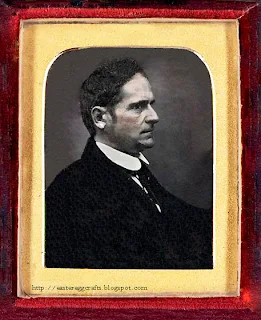 |
| An early daguerreotype of Senator and Episcopalian, Daniel Webster. |
It is noble faculty of our nature which enables us to connect out thoughts, our sympathies, and our happiness, with what is distant in place or time; and, looking before and after, to hold communion at once with our ancestors and our posterity. Human and mortal although we are, we are nevertheless not mere insulated beings, without relation to past or the future. Neither the point of time, nor the spot of earth, in which we physically live, bounds our rational and intellectual enjoyments. We live in the past by a knowledge of its history; and in the future by hope and anticipation.
As it is not a vain and false, but an exalted and religious imagination, which leads us to raise our thoughts from the orb, which, amid this universe of worlds, the Creator has given us to inhabit, and to send them with something of the feeding which nature prompts, and teaches to be proper among children of the same External Parent, to the contemplation of the myriads of fellow-beings, with which His goodness has peopled the infinite space--so neither is it false or vain to consider ourselves as interested and connected with our whole race, through all time; allied to our ancestors; allied to our posterity; closely compacted on all sides with others; ourselves being but links in the great chain of being, which begins with the origin of our race, runs onward through its successive generations, binding together the past, the present and the future, and terminating at last with the consummation of all things earthly, at the throne of God. - Daniel Webster.
LONG LIFE AND HARD STUDY
Devotion to intellectual pursuits and to studies, even of the most severe and unremitting character, is not incompatible with extreme longevity, terminated by a serene and unclouded sunset. Dr. Johnson composed his “Dictionary” in seven years! And during that time he wrote also the Prologue to the opening of Drury Lane Theatre; the “Vanity of Human Wishes;” the tragedy of “Irene;” and the “Rambler;”—an almost incomprehensible effort of mind. He lived to the age of seventy-five. When Fontenelle’s brilliant career terminated, and he was asked if he felt pain, he replied, “ I only feel a difficulty of existing.”

No comments:
Post a Comment
Thanks for your thoughts. All comments are moderated.